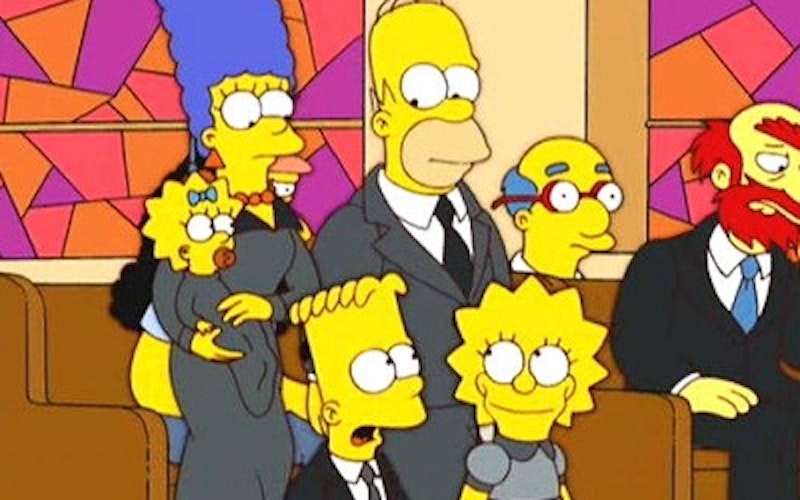
TV
Why The Simpsons went to church (and what they found there)
In The Simpsons’ 1990s heyday – well before the Simpsons Marathon currently going on at FX - pundits frequently observed that it was one of the only places on television where the characters regularly went to church. That fact pushed back against the conservative outrage - they swear! they neglect their kids! they fight! they bite! - that dominated media dissections of the animated show. If you didn’t live through it, you might not know how stridently the show's nature was debated at the height of family values hysteria. Bart Simpson, that little self-interested scamp, represented to many people a demonic force of cultural decay - all the worse because kids snapped up his copious merchandising.
It all seems quaint now that we’ve moved on to handwringing over violent antiheroes colonizing basic cable. Yet that one strange fact remains. The Simpsons didn’t just go to church on the occasional special episode; any week might find them in the pews listening to Reverend Lovejoy. And when they weren’t in church, they were interacting with their super-Christian neighbor Ned Flanders and his two angelic, Sunday school-educated boys, who enjoyed praying for all the little children who don’t pray for themselves (like Bart). Christianity is all around in Springfield - as much a part of the atmosphere as the airborne petrochemicals from the unquenchable tire fire.
What makes the treatment of religion so notable in The Simpsons is its very mundanity. Check out almost any scripted network show that existed in the 20 years prior to The Simpsons, roughly since the time The Andy Griffith Show went off the air in 1968. If a plot revolved around a preacher, priest or a pious character, they were either virtuous paragons or hypocritical bigots. Prior to The Simpsons, Christians existed on television in order to inspire us, have their narrow minds expanded or get their comeuppance. They angelically accepted their fate in hospital rooms in order to evoke wonder from doctors (Scrubs); fleeced the credulous in order to inspire the wrath of the law (Law & Order); and crusaded for conformity in order to provide an appropriate foil to the tolerance and humanism of the hero (Murphy Brown).
What makes the treatment of religion so notable is its very mundanity.
But on The Simpsons, the characters and story lines defined by religion are far closer to our everyday experience. The platitude-spouting parson; the relentless ray of sunshine; the pearl-clutching defender of public decency; the weary church bureaucrat; the sheltered, homeschooled child; the hell-raising preacher’s kid. Sunday services are a community obligation for the Simpson family, rather than a reverent ritual, ostentatious pious display or source of spiritual nourishment. It’s what good people do, and Marge Simpson (more than anyone) wants her family members to be moral, well-meaning, solid citizens. Like so many American parents who would never register for a discipleship weekend or utter the word “missional,” she wants to instill values in her children and keep her spouse connected to community standards. Dollop a little Bible and Jesus on the side, like a ramekin of catsup that comes with your fries, and you’ve got yourself an ethos.
American Christianity has changed a lot since The Simpsons began portraying it. Many communities have an image of clergy that’s less Reverend Lovejoy’s vaguely mainline-Protestant collar, vestments and pulpit, and more jeans, rolled-up sleeves and giant PowerPoints. Yet as the FX marathon reveals, the everyday face of our civil religion has rarely been as thoroughly portrayed on television as it has been on The Simpsons. And if seeing a bright yellow, four-fingered version of themselves on screen has caused some Christians to change – to become more like Marge and less like Helen Lovejoy; to be more welcoming of eternally questioning Lisas and less smugly approving of little Todds and Rods - then the show has surely been doing God’s work all along.
Topics: TV, Culture At Large, Arts & Leisure